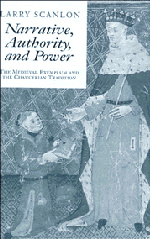Book contents
- Frontmatter
- Contents
- Acknowledgments
- INTRODUCTION: EXEMPLARITY AND AUTHORITY IN THE MIDDLE AGES
- PART 1 THE LATIN TRADITION
- PART 2 THE CHAUCERIAN TRADITION
- 6 Exemplarity and the Chaucerian tradition
- 7 Canterbury Tales (I): from preacher to prince
- 8 Canterbury Tales (II): from preaching to poetry
- 9 Bad examples: Gower's Confessio Amantis
- 10 The Chaucerian tradition in the fifteenth century
- Bibliography
- Index
7 - Canterbury Tales (I): from preacher to prince
Published online by Cambridge University Press: 16 September 2009
- Frontmatter
- Contents
- Acknowledgments
- INTRODUCTION: EXEMPLARITY AND AUTHORITY IN THE MIDDLE AGES
- PART 1 THE LATIN TRADITION
- PART 2 THE CHAUCERIAN TRADITION
- 6 Exemplarity and the Chaucerian tradition
- 7 Canterbury Tales (I): from preacher to prince
- 8 Canterbury Tales (II): from preaching to poetry
- 9 Bad examples: Gower's Confessio Amantis
- 10 The Chaucerian tradition in the fifteenth century
- Bibliography
- Index
Summary
Most readers of the Canterbury Tales will agree that its opening fragment, in its movement from the Knight's Tale to the Cook's Tale, produces an unraveling of textual authority. Lee Patterson has argued convincingly that a similar movement occurs across Fragments II and III, with an important difference. The Wife of Bath's Tale subverts “the authoritarian orthodoxy of the Man of Law,” and opens the way for the even less decorous quarrel between the Friar and the Summoner – a quarrel that begins with the Friar's declaration that
… heere as we ryde by the weye,
Us nedeth nat to speken but of game,
And lete auctoritees, on Goddes name,
To prechyng and to scoles of clergye.
(III, 1274–77)But unlike Fragment I, which ends in complete irresolution with the Cook's Tale, the Summoner's Tale closes Fragment III with a scene in the feudal court of a lord of the manor. In quitting the Friar, the anti-fraternal game played there also demonstrates the efficacy of feudal lordship. Fragment III thus restores to some extent the lay authority Fragment I had called into question.
I would like to take this argument a step further. Fragment III is followed in most manuscript orders by the Clerk's Tale, the collection's first public exemplum, which combines an exploration of monarchical authority with a return to the genre of the Man of Law's Tale. This alerts us to another difference between Fragment I and Fragments II and III.
- Type
- Chapter
- Information
- Narrative, Authority and PowerThe Medieval Exemplum and the Chaucerian Tradition, pp. 146 - 191Publisher: Cambridge University PressPrint publication year: 1994



